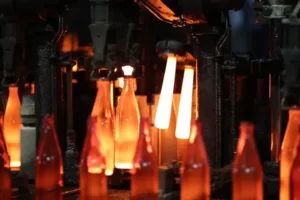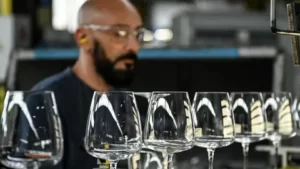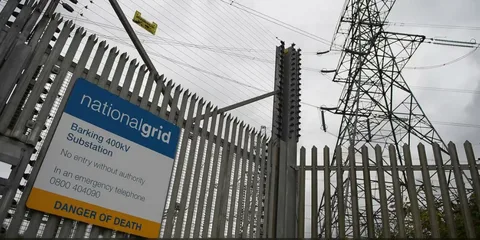Electricity prices have soared in Europe and businesses are having to tighten their belts, the NYT reports. They’re cutting production and staff, refusing to use environmentally friendly fuels, and then a chain reaction follows: people are getting poorer, the recession is accelerating. And there is no hope for improvement.
Companies put workers on unpaid leave and shut down production lines because they cannot pay for gas and electricity.

Heated to 1,500 degrees Celsius, the furnace is red-hot. Workers at Arc International’s glassworks were loading sand into the furnace, which was slowly turning into a molten mass. Nearby, hot air streams were used by machines to turn the shapeless liquid into thousands of exquisite wine goblets, to be sold to restaurants and housewives around the world.
Company President Nicholas Hodler looked over the assembly line, which shimmered with the blue flame of natural gas. For years the company operated on cheap energy, making it the world’s largest manufacturer of glassware and an important employer in the north of France, where most of the working class lives.
But when Russia suddenly cut off its gas supply to Europe, the company faced new risks. Electricity prices started rising so fast that Hodler had to rewrite its business forecasts six times in two months. He recently placed one-third of Arc International’s 4,500 employees on partial paid leave to save money. Four of the plant’s nine furnaces will be idle and the rest will switch from gas to diesel. It is cheaper, but more polluting.
“This is the most dramatic situation we have ever faced,” said Hodler, trying to drown out the clinking of glasses. – For energy-intensive companies such as ours, it is catastrophic.”
Arc is not the only company in this position. High energy prices are hitting the European industry hard, forcing factories to cut production at short notice and send tens of thousands of staff on leave without pay. Although such measures are expected to be temporary, they do increase the risk of a painful recession in Europe. Industrial production in the region fell by 2.3% in July compared to the same period last year, the most marked decline in more than two years.
Manufacturers of metal, paper, fertilisers and other products need gas and electricity to turn raw materials into finished goods – from car doors to cardboard boxes. All of them have announced belt-tightening. According to the European metals trade association Eurometaux, production of aluminium and zinc in the region has been halved.
Among those companies is Arcelor Mittal, Europe’s biggest steelmaker, which is idling its blast furnaces in Germany. Global aluminium producer Alcoa is cutting production at its smelter in Norway by a third. Nyrstar, a major zinc company, is shutting down production in the Netherlands indefinitely.
Even toilet paper is not insured. The German company Hakle, one of its biggest suppliers, has declared bankruptcy because of the “historic energy crisis”.
Eschenbach Porcelain survived Germany’s transition from communism to capitalism in 1989. But when its electricity contracts expire at the end of the year, it will have to pay bills of 5.5 million euros a year, six times more than it does now, said Rolf Frowein, the firm’s director.
“It means we will have to raise our prices more than twice, then no one will buy our cups and plates,” he said.
Eschenbach Porcelain is 130 years old, based in the eastern state of Thuringia. It is now negotiating with local politicians to find a solution. It and dozens of other German small and medium-sized businesses fear they may have to close for good.
France’s largest aluminium smelter, Aluminium Dunkerque, is an hour’s drive away from the Arc factory. Faced with the threat of a fourfold increase in energy costs, the company has put some of its workers – there are 620 at the plant – on unpaid leave and cut production by more than 20%.

The glassworks, which uses as much electricity as 200,000 homes, produces tableware including Luminarc dinner plates and Cristal d’Arques table and barware. The company manufactures a total of four million glasses a day, plus candlesticks for retailers Bath & Body Works and promotional tumblers for Heineken and McDonald’s.
The dishes require high enough temperatures to melt the sand in the kiln and turn it into glass. The furnace has to work around the clock. Over the summer, the energy crisis in Europe caused Arc’s electricity bills to soar to $75 million. A year ago it paid 19 million euros. In addition, consumers have suddenly stopped buying items such as candlesticks and washing machines, for which the Arc factory makes glass hatches. Orders have fallen sharply because of this.
“People are worried about winter electricity bills. They are saying that the purchase of secondary goods can wait,” said Hodler.
Such a double blow has forced Arc managers to urgently look for new solutions. All of them turned out to be quite unpleasant. This month, in an effort to cut costs, 1,600 workers have been asked not to come to work twice a week. And for the first time the company’s furnaces will switch to diesel, whereas previously the plant used gas, which was fed there directly by pipeline. Because of the diesel, the company’s carbon emissions will increase by 30%. Diesel will have to be transported to the plant in huge quantities by tanker truck.
It will be even more difficult to decommission the plant’s furnaces. “The glass furnace cannot simply be shut down, because that would destroy it,” Hodler explained. – If you gradually and smoothly put it into shutdown mode, it will survive. But it will take over a month to reheat it.

For two of the furnaces, scheduled maintenance was going to take place, but now they will be taken out of service indefinitely, Hodler said. Another two will be temporarily mothballed due to lower production demand.
We do not want to shut down production completely,” stressed Hodler. – But we cannot afford to operate at a loss, either.
All this is very worrying for the residents of Arc. At Café Le Cristal, which is frequented by the factory’s employees, the only talk is about the fate of the ovens.
“Arc is the backbone of our region,” said owner Valerie Harle. – If the ovens don’t work, the employees don’t work either.”
Her café opened in 1939, named after Georges Durand, who transformed a run-down factory into the Cristallerie d’Arques empire.
Arques resident Veronique Cognoti says locals are preparing for a “domino effect”.
“Many businesses are directly dependent on the plant,” she explained. – Transport companies, cardboard manufacturers. Now all of them will feel the force of the blow.”
A man sitting at a nearby table asked not to be named and said he had been sent on holiday this month. He works nearby, in a cardboard factory that makes boxes and packaging for a glass factory. He is forced to take a holiday because of the cutbacks in production.
“With these electricity prices, the factory can no longer operate as before and a chain reaction ensues,” said the man.
While the cardboard factory is idle, he is paid 80% of his wages. He loses 130 euros. But at the same time he has to pay almost 100 euros for petrol to fill up his small car, although at the beginning of the year these costs were half as much.
“There will be much more problems,” he said.
570 total views, 2 views today



